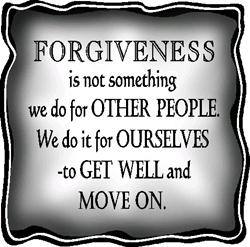The following is an excerpt of an article I recently came across on The Journey with Jesus – Notes to Myself Weekly Essays (website) by Daniel B. Clendenin, PhD.:
Should Americans forgive the perpetrators of the 9/11 attacks? I’ve been wondering about a possible parallel scenario.
Could you or should you forgive Dr. Mengele, the Nazi “angel of death?”
That question haunted Eva Kor, who tells her remarkable story in the documentary film Forgiving Dr. Mengele (2007). Eva and her twin sister Miriam spent ten months in Auschwitz. Along with many other twins, they were separated from their families and subjected to Mengele’s horrific “medical” experiments. After liberation by the Soviets when she was ten-years old, and then ten years in Israel, Eva relocated to Terre Haute, Indiana in 1960 and raised a family.
Eva returned to Auschwitz for the first time in 1995 for the 50th anniversary of the liberation of the camps, and on that occasion she did the unthinkable. She read aloud her personal “official declaration of amnesty” to Mengele and the Nazis. To be liberated from the Nazis was not enough, she said; she needed to be released from the pain of the past. To extend forgiveness without any prerequisites required of the perpetrators, said Eva, was an “act of self-healing.” Through the act of “forgiving your worst enemy” Eva said that she experienced “the feeling of complete freedom from pain.” Many Jews were outraged by her act.
In the lectionary readings this week, Jesus and Joseph commend the healing power of forgiveness.
Joseph believed that God had a larger providential purpose for Israel beyond the private wrongs he had suffered at the hands of his brothers: “Don’t be afraid. Am I in the place of God? You intended to harm me, but God intended it for good” (Genesis 50:20). At least four times he reassures his nervous brothers, “it was not you who sent me to Egypt, but God” (Genesis 45:5, 7, 8, 9). The story concludes: “Joseph reassured them and spoke kindly to them.”
And in the gospel for this week, Peter asked Jesus, “how many times shall I forgive my brother when he sins against me? Up to seven times?” Forgiving someone seven times is generous in the extreme, but Jesus upped the ante and expanded the arithmetic of forgiveness.

Jesus told an outlandish parable about an “unmerciful servant” who received forgiveness for his own enormous debt, but then instead of extending forgiveness for a tiny debt that he was owed, he imprisoned his debtor. In the kingdom of God that Jesus announced, he instructed us to forgive not merely seven times, but seventy-seven times, or seventy times seven. The forgiveness that characterizes his kingdom is beyond calculation or comprehension.
Jesus also linked receiving forgiveness to offering forgiveness. He established a law of proportionality. We can expect divine forgiveness in the measure that we extend human forgiveness: “This is how my heavenly Father will treat each of you unless you forgive your brother from the heart.” Similarly, in the Lord’s Prayer we ask God to “forgive us our debts, as we forgive our debtors.” Our own sense of the need of forgiveness is the basis upon which we freely forgive others. We can only long for ourselves what we lavish upon others.
Forgiveness of this magnitude finds its basis not only in our own sense of need but, even more sure and certain, in the character of God himself as a fundamentally forgiving God. Paul writes, “be kind and compassionate to one another, forgiving each other, just as in Christ God forgave you” (Ephesians 4:32). And in this week’s epistle: “Accept one another, just as God has accepted you” (Romans 14:1, 15:7).
Frederic Luskin, co-founder of Stanford University’s “Forgiveness Project,” says that forgiveness “reduces anger, hurt, depression and stress and leads to greater feelings of optimism, hope, compassion and self confidence.” Luskin has conducted numerous workshops and research projects on forgiveness. He’s worked with a wide variety of people in corporate, medical, legal and religious settings. In his book Forgive for Good, Luskin elucidates what Eva Kor experienced and what Joseph and Jesus taught, that in forgiving we can become “heroes instead of victims in the stories we tell.”
This excerpt above is by Daniel B. Clendenin, Ph.D. and is reprinted from http://www.journeywithjesus.net/Essays/20110905JJ.shtml
———————————————————————————————————–
More thoughts and quotes on forgiveness I’ve collected from various sources:
“Forgiveness is the fragrance that the violet sheds
on the heel that has crushed it.” – Mark Twain
To forgive is to set a prisoner free
and to discover that the prisoner was you.
– Lewis Smedes
“The weak can never forgive.
Forgiveness is the attribute of the strong.”
– Gandhi
Never does the human soul appear so strong
as when it forgoes revenge
and dares to forgive an injury.
– Edwin Hubbel Chapin

Forgive all who have offended you; not for them, but for yourself.
– Harriet Nelson
“He who is devoid of the power to forgive, is devoid of the power to love.” – Martin Luther King, Jr.
“Forgiveness is the sweetest revenge.” – Isaac Friedmann
There is no revenge so complete as forgiveness. – Josh Billings

———————————————————————————————————–

Note: For more perspectives on reconsidering 911, please see my initial post on this topic here: https://unleashyourinnerstrength.com/2010/09/21/reconsidering-911/
– Eric Falcon





Yes!